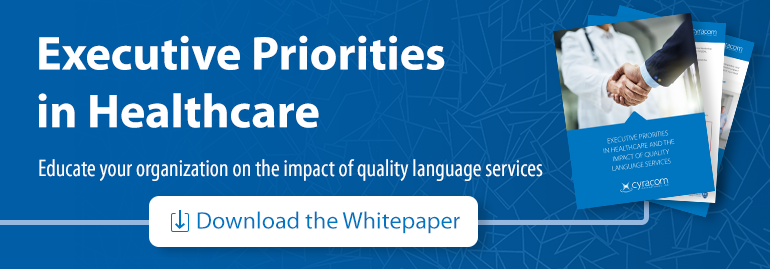
Excelling in language services may improve the metrics your executive team cares about – but does your leadership understand that? Are they aware that an investment in quality language solutions today may produce tangible, organization-wide benefits for years to come?
As the leading provider of language services to hospitals and healthcare organizations, CyraCom recently developed a brand-new whitepaper, Executive Priorities in Healthcare and the Impact of Quality Language Services. This new resource is designed to help:
Healthcare executives understand how limited-English proficient (LEP) patients impact overall priorities
Language services leaders make a compelling case to their bosses for building a quality language access program
Procurement teams choose a language services provider based on quality
Here’s an excerpt from the new whitepaper that explains how a quality language services program impacts Section 1557 compliance. Take a look, then download the full whitepaper below:
Section 1557
Why it Matters to Executives
Hospitals that fail to comply with Section 1557’s language access requirements may face investigation by the Department of Health and Human Services’ (HHS) Office of Civil Rights. Section 1557 also empowers LEP individuals to file legal claims against medical providers who fail to provide qualified interpreters. The law applies to all healthcare organizations and programs that receive federal funding, are administered by HHS, or participate in the Health Insurance Marketplaces.
The Role of Quality Language Services
Section 1557 requires hospitals to:
1. Post Notices of Nondiscrimination
Section 1557 requires providers to post a notice of nondiscrimination and taglines (short statements advising language services are available) in the state’s/hospital’s top 15 languages. HHS has compiled state-specific language lists for download, including taglines in 64 languages.
2. Use Qualified Interpreters for all LEP Patient Interactions
HHS’s 2016 guidance on Section 1557 mandates “qualified interpreters”. Being bilingual is insufficient; rather, HHS states that a qualified interpreter must:
- Adhere to ethical principles such as client confidentiality.
- Possess proficiency in speaking and understanding English and one additional spoken language.
- Be able to use all necessary specialized vocabulary and phraseology effectively, accurately, and impartially
Conversely, Section 1557 specifically prohibits the use of:
- A patient’s minor children (except in emergencies to prevent imminent patient harm.)
- Adult family and friends (unless the patient refuses an interpreter. Providers may still utilize an interpreter if they determine the family member/friend cannot interpret adequately.)
- Bilingual staff, unless they have interpreting listed as part of their “current, assigned job responsibilities” and are qualified as defined in the HHS guidance
3. Ensure Remote Interpretation Partners Meet Section 1557’s Quality Standards
Section 1557 permits hospitals and healthcare organizations to use qualified phone and video interpreters if the technology involved meets the quality standards set for ASL interpretation by the Americans with Disabilities Act.
Download the full whitepaper to learn more about how a quality language services program impacts executive-level priorities like Joint Commission compliance, readmission rates, and more:




